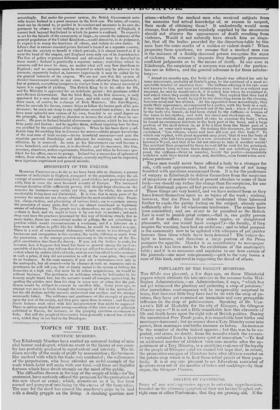SCIENTIFIC MURDERS.
TOPICS OF THE DAY.
Tiut Edinburgh Murders have excited an universal feeling of min- gled horror and disgust, which no event in the history. of our coun- try has probably produced to equal extent and intensity. The hi- deous novelty of the mode of profit by assassination ; the business- like method with which the trade was conducted; the callousness of the'perpetrators, who have afforded an awful example of the work which habit will make with our kind,—all these are frightful features which have dwelt strongly on the mind of the public. The difficulties thrown in the way of the supply of bodies for the anatomist, have certainly offered the premium for the production of this new shoot of crime ; which, monstrous as it is, has been nursed and pampered into being by the excess of the humanities. The care for the dead has caused the murderer's gripe to be laid with a deadly grapple on the living. A shocking question now
arises—whether the medical men who received subjects from the assassins had actual knowledge of, or reason to suspect, their mode of obtaining them? It undonbtedly would seem strange, that the gentleman regularly supplied by the miscreants should not observe the appearances of death resulting from violence. Would it not naturally have struck him as singu- lar, that all the bodies provided for the dissection-table by this man bore the same marks of a .sudden or violent death ? When proposing these questions, we assume that a medical man can in the instance of a freshly-deceased person recognize the signs of violence. On coroner's inquests they frequently pronounce confident judgments as to the means of death. In one case in Edinburgh, the suspicion of a surgeon was excited : the particu- lars are as follows, and the general inference is far from satisfac- tory;:— "About six months ago, the body of a female was offered for sale by some miscreants, probably of Burke's gang, to the assistant of a most re- spectable teacher of anatomy here. The ruffians offering it for sale were not known to him, and were not resurrection-nice; but as a subject was required, he said he would take it, if it suited him when he examined it, and asked when they could fetch the body. They replied that they had it now, and that they would bring it to the dissecting-room in the evening, between nine and ten o'clock. At the appointed hour accordingly, they made their appearance, accompanied by a porter, with the body in a sack. It was taken in, of course, and turned out of the sack ; when it proved to be the body of a female, as had been stated by the ruffians—a woman of the town in her clothes, and with her shoes and stockings on. The as- sistant was startled, and proceeded at once to examine the body ; when he found an enormous fracture in the back part of the head, and a large portion of the skull driven in, as if by a blow from the blunt part of a hatchet, or some such weapon. On making this discovery, he instantly exclaimed, You villains, where and how did you get this body ?' To which one replied, with great apparent sangfroid, 'that it was the body of a woman, who had been popped in a row (murdered in a brawl) in Hal- kerston's Wynd, and that if he did not choose to take it another would.' The assistant then proposed to them to wait till he sent for his principal, his intention being to have them detained ; but not relishing this pro- posal, the ruffians—three in number, beside the porter—immediately withdrew with their horrid cargo, and, doubtless, soon found a less scru • pulous purchaser."
These men would never have offered a body to a stranger for sale, with such appearances, had not the custom of not being troubled with questions encouraged them. It is for the professors of surgery in Edinburgh to deliver themselves from the suspicion of misprision of murder which at present attaches to some of their body—we should say rather the charge than the suspicion, for one of the Edinburgh papers all but presents an accusation.
These things are very horrid, and we have noticed them as they have forced themselves upon us as topics of the week ; wishin7, however, that the Press had rather moderated than laboured further to excite the public feeling on the subject, already quite sufficiently alive for all wholesome tendencies. The crimes have been committed; and, are about to be punished as the British Law is wont to punish great crimes,—that is, one guilty person out of four suffers ; (had they stolen apples, or slaughtered pheasants, not one would have escaped !)—the faculty, if they require the warning, have had an awful one ; and to What purpose is the community now to be agitated with whispers of yet greater horrors than those which have been detected ? The vulgar de-
light in horrors, and therefore a large portion of the Press pampers the appetite. Murder is as contributory to newspaper
profits as it has been made to the exhibitions of the anatomist's table ; and it is as nauseous and repulsive to see how certain of the' journals—one most conspicuously—pick to.the very bones a case of this kind, and revel in suggesting the dread of others.





















 Previous page
Previous page